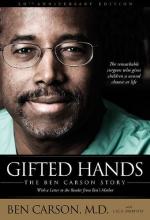
|
| Name: _________________________ | Period: ___________________ |
This test consists of 5 multiple choice questions, 5 short answer questions, and 10 short essay questions.
Multiple Choice Questions
1. What does the author believe, even after losing Jennifer, about his relationship to patients?
(a) He thinks it is fine to be emotionally attached.
(b) He feels he is a father figure to his patients.
(c) He believes he will cry whenever he loses a patient.
(d) He believes nurses should break bad news to parents for him.
2. In "A Special Year," why was the author concerned about his wife traveling to Australia?
(a) She was pregnant and on bed rest.
(b) She would have to quit a lucrative job.
(c) She hated warm climates.
(d) She would have to leave all of her close friends.
3. As Susan recalled her story in "Craig and Susan," who did she tell God she was like from the Bible?
(a) Isaac.
(b) Abraham.
(c) Moses.
(d) Ruth.
4. What is a pupilary response?
(a) When someone goes blind.
(b) When someone's eyes react to dust or other foreign objects.
(c) When students answers a teacher's question.
(d) When pupils respond to light.
5. What homework assignment did the author give Luis and Terry Francisco before Maranda's surgery?
(a) Buy Maranda a toy from the gift shop.
(b) Watch some movies to distract them from worry.
(c) Say their prayers.
(d) Sign up for family counseling.
Short Answer Questions
1. What does the author say happened every time an instrument touched Maranda during her surgery?
2. Why did the chief of surgery at Provident Hospital suggest the author did not want to stay at Johns Hopkins?
3. What time does the author decide he must leave work each day, in "Family Affairs"?
4. How long did Maranda's hemispherectomy take in "Heartbreak"?
5. What reason does the author give for not wanting to travel to Australia, in "A Special Year"?
Short Essay Questions
1. Why did Brian and Kathy Usher initially decide against the hemispherectomy for their daughter, Beth?
2. What prompted the author to apply to Johns Hopkins for his internship and residency?
3. Why does the author say "no knowledge is ever wasted," in "Another Step Forward"?
4. Who does the author say he feels a self-imposed obligation to act as a role model for?
5. How did the chief of surgery at Provident Hospital try to lure the author to work for him?
6. Describe Maranda Francisco's improvements after her hemispherectomy.
7. What does the letter T stand for in the author's "Think Big" acrostic?
8. What is Rasmussen's encephalitis?
9. What was unusual about Craig being able to eat a whole plate of spaghetti, six weeks after his surgery?
10. How does the author explain the phenomenon of plasticity?
|
This section contains 1,047 words (approx. 4 pages at 300 words per page) |

|




